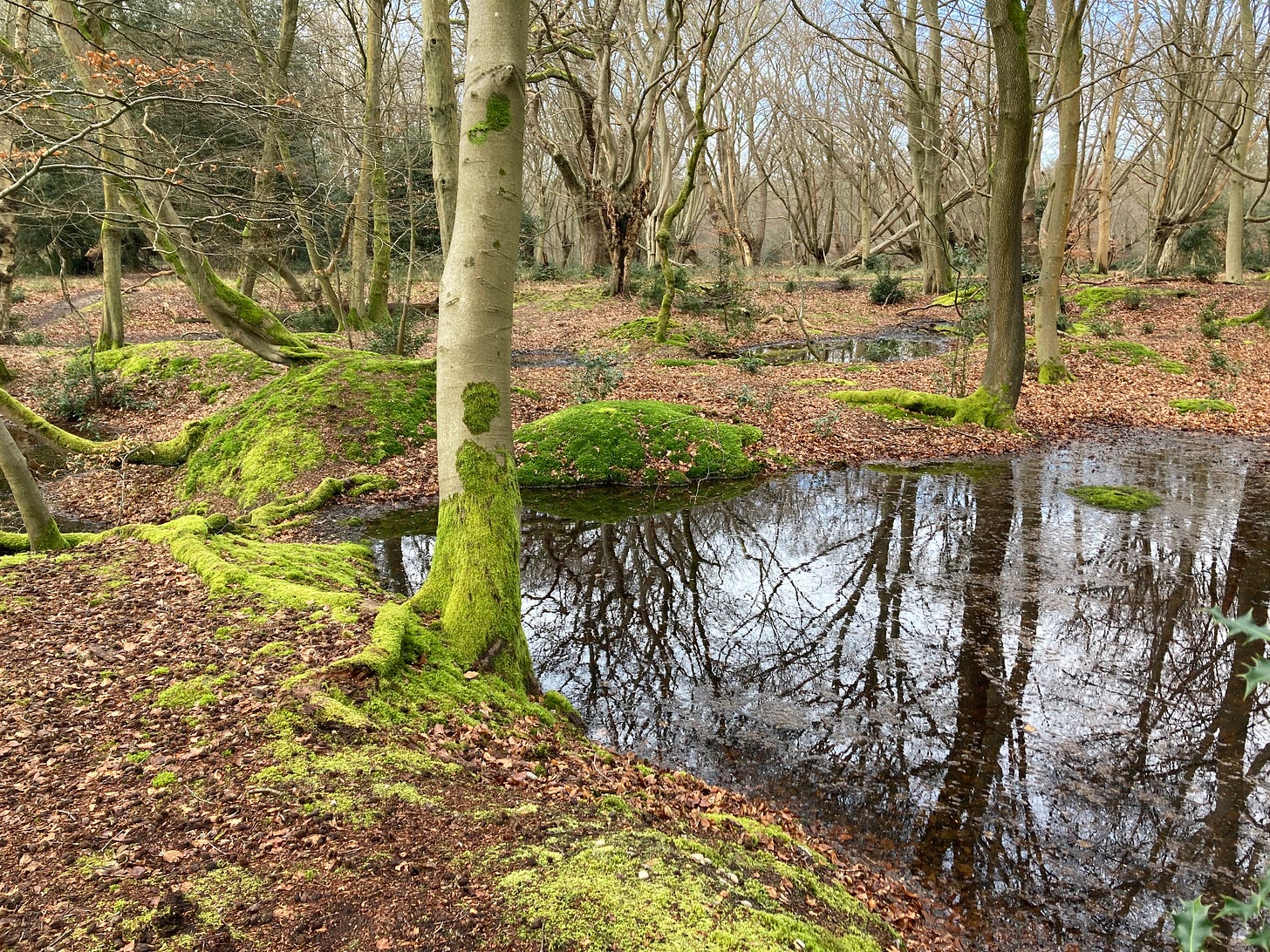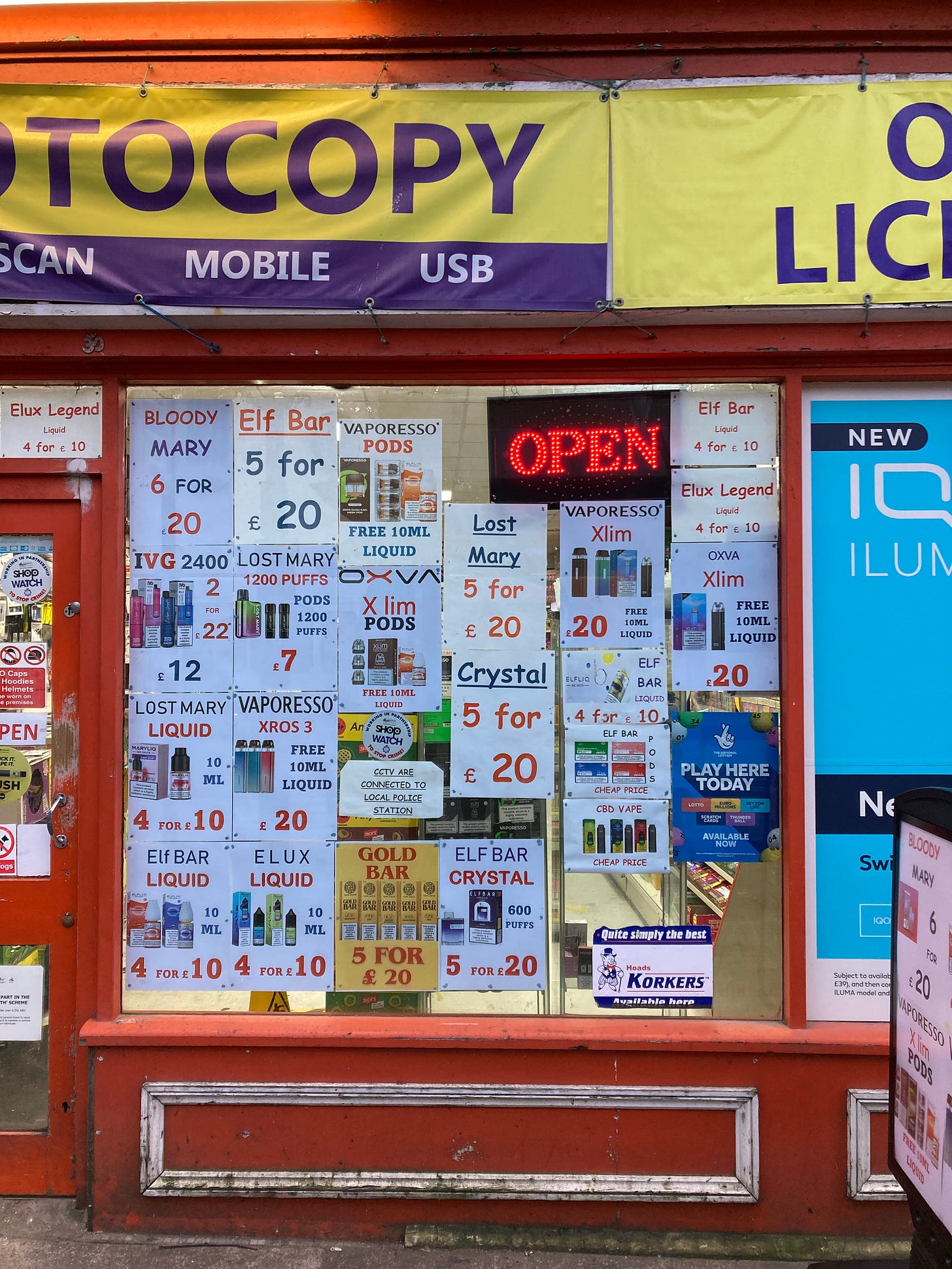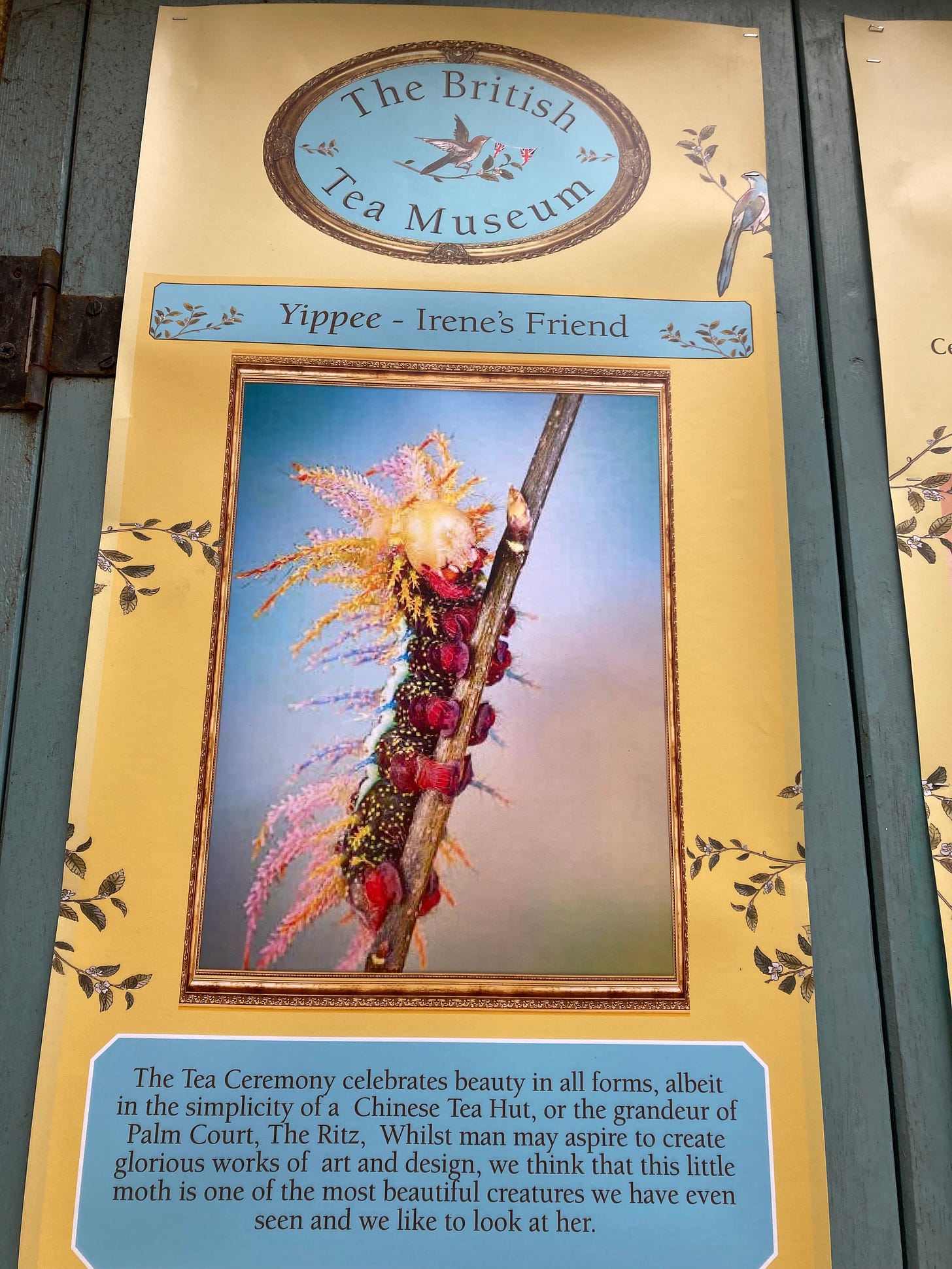Hi again,
In case you haven’t seen one of these before, this is where I pull together a load of tabs I have open across my devices… Some I have read, or at least skimmed, some I haven’t. So inclusion not endorsement etc. Just stuff that might be of interest. It also means I now feel as though these tabs can be closed :)
I’ve added more commentary and quotes this time, not entirely sure why. Just felt like it. Let me know if you think this adds value or takes it away…
And re: images here, think I’m going to go for photos I’ve taken recently rather than art from exhibitions I’ve seen. Will save the latter for the main newsletter editions.
Happy rabbit-holing!
Climate crisis
10 New Insights in Climate Science 2023/24. Not sure how surprising these are from a quick skim, but probably rewards a more detailed read (the 2022 edition felt slightly more compelling). The point about human immobility in areas exposed to climate risk increasing is unnerving, though. We could have a lot of populations trapped in the midst of crisis. Speaking of which…
You, too, can be a climate refugee! 10 simple steps for increasing your chances for displacement and ruination. I’ve followed Alex Steffen for a long time, and he’s generally one of the more realistic commentators on climate crisis out there imo. This piece is a jokey (I think misjudged) sales pitch for his ‘personal ruggedisation’ courses, which I feel weird about. The framing is individualistic (how to save yourself and those you love), and the prices are high (I get that he has to make a living etc.). Worry that it feeds into self-serving rather than community-strengthening behaviours on the part of the wealthy — especially in terms of encouraging people to find climate-resilient homes now, which is guaranteed to inflate prices and make those homes/locations even more inaccessible for the less well-off. But it’s interesting these courses exist, still unusual to see anyone confronting the realities of this shift head-on.
Health psychology and climate change: time to address humanity’s most existential crisis. ‘Because of their unique expertise and skills, health psychologists are urgently needed in crafting climate change mitigation responses.’ Honestly, this had not occurred to me, but it does make sense given the health impacts of climate change + the behavioural change needed.
(Curious that my reading has shifted more towards adaptation lately. Unsure whether that’s just a reflection of the work I’ve been doing, which has been more focused at this end of the scale, or of a wider shift in the discourse as 1.5C becomes locked in ☹️ )
Questioning AI
The messy landscape of artificial intelligence ethics and risk - a note for activists. Lots to unpick in this Gail Bradbrook piece. Some strong overlaps with Anticipant #5. ‘I'm scared of AI that is aligned to the limited intelligence of the left hemisphere, whose rightful place is in service to beauty and love, the aliveness and connection of the right hemisphere. If AI can be aligned to that of the right hemisphere, to that of living systems, then it isn't artificial, it could simply be the next way that life is living through us.’
Measuring AI’s Environmental Impacts Requires Empirical Research and Standards. Concerns about the environmental impact of AI seem to have fallen by the wayside a bit lately. A new bill introduced in the US Senate hopes to address this. See also Kate Crawford in Nature on this topic.
Exactly - ‘AI for Artists’, where you train a model with your art and own both the model and its outputs.
(Another plug for the Paradigm Junction AI Digest, where James and I analyse the latest AI developments affecting organisations and the world of work. Also check out Gavin Freeguard’s crazily comprehensive Data Policy Digest for Connected by Data, which is a veritable data/tech/AI link feast.)
Other risks material
WEF Global Risks Report 2024. Pretty bleak picture, with environmental issues packing it out at the top of the 10y severity predictions (the NATO Strategic Foresight Analysis 2023 covers some similar ground, another useful scanning tool).
Global hazards weekly bulletin. A UK Health Security Agency email, archived by a friendly-looking climate science professor. Latest one here. Depressing but eye-opening overview of all the extreme weather (and other hazards) events worldwide. See also the Last Week in Collapse newsletter.
Reducing risks in a risky world. BBC World Service radio show on how a Japanese city is trialling the use of automated drones to deliver disaster warnings. Haven’t listened but is apparently good.
New ways of living, knowing, being
Longing for a time finally caught up with us: Why queerness could be a transformative power for systems change. Found this v moving from Eva at Futurall, has prompted lots of thoughts and discussion on the power of queer nightlife in the exploration and shaping of possible futures.
Kohei Sato on Degrowth Communism. A handful of video interviews on Synthetic Zerø, which generally looks like a fun site to hang out on.
Kairos. ‘a new London space exploring ideas for radical social and cultural change in response to the climate and nature crises.’ Lots of interesting events here, worth checking out.
Future of philanthropy
What’s the future of philanthropy? A few different perspectives, pulled together by Stir to Action.
That article was prompted in part by Lankelly Chase’s decision to redistribute all of its assets and close over the next 5y, in a bid to undo its involvement in the ‘Colonial Capitalism’ traditional philanthropy model. Pretty wild and worth reading the link.
Alternative funding approaches and foundations:
Transition Resource Circle: ‘We work through circle ways (e.g. non-hierarchical, embodied cognition approaches, psycho-spiritual practices) to move from a culture of entitlement to ways which honor the multiple entanglements of historical precedents, our respective lineages & karmic storylines, and what future beings (including ourselves) require for reconciliation and healing.’
Baobab Foundation: ‘a Funding Organisation, a growing movement and a support system for Black African/Caribbean and Global Majority (People of Colour) communities in the UK’
Solid Fund: ‘Solidfund is a permanent common fund, paid for by the voluntary subscriptions of worker cooperative members, workers' cooperatives, individuals and organisations that support industrial democracy and collective ownership.’
Losing Control: ‘a peer-led network of over 700 individuals from across sectors who want to share power more equally as a way of unleashing social change’
Books I want to read
Herland - Charlotte Perkins Gilman. ‘A lost feminist utopian novel from the author of The Yellow Wallpaper’
The Matter with Things - Iain McGilchrist. Was reminded of this by the Gail Bradbrook piece above, am hoping it costs less than £45 second-hand…
Owlish - Dorothy Se. Bizarro Hong Kong fairytale vibes.
Overflow
The ABCs of the New Economy: A practical primer and event guide to inspire local economic change. More from Stir to Action, ‘tools and ideas for workplaces, communities, and movements for change.’ They also run a magazine, which I think is primarily print but there’s lots of good-looking stuff online, e.g. on community ownership of social spaces (e.g. music venues), the ‘elective affinity’ between romanticism, anti-capitalism and ecology, etc.
From Ozempic pens to Taylor Swift’s favourite accessories: 12 objects that defined 2023. I’d never encountered most of these, weird insight into current American (I think? rather than global) culture.
ICO Tech Horizons Report. Horizon scanning and scenarios work from the ICO Futures team (who I did some work with through SOIF a couple of years ago), exploring 8 priority technologies and their interrelations.





